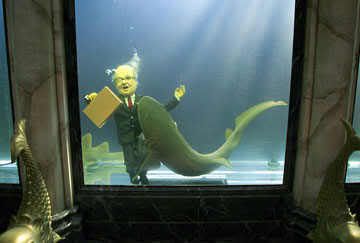I contend that it is neither absolutely realist nor absolutely liberal, but has a few aspects of each. According to the UN’s official website, “… representatives of 26 nations pledged their governments to continue fighting together against the Axis Powers.” The conception of the UN was a group of nations cooperating out of strategic defense interests. [/end realism]
Today the UN has become an organization that tries to see the world as malleable [liberal point 1: we can impact the way the world is organized], sometimes absurdly so. The point of the UN is now one of cooperation to advance mutual interests and, as the Charter of the UN reads, “…to practice tolerance and live together in peace with one another as good neighbours, and to unite our strength to maintain international peace and security…” [liberal point 2: safety, though important, is not necessarily the most important issue] The UN also believes in the importance of trade, diplomacy, treaties, etc [liberal point 3: significance of social institutions (see PTJ’s podcast on liberalism)].
Ok so that sounds pretty liberal, right? There are, however, two essential issues that come between the UN and liberalism.
1. Reason (my favorite thing about liberalism). The UN doesn’t make a lot of sense. The fundamental problem with the UN is that there is no one mutual interest that all member states share (don’t even think about citing ‘peace’ as a mutual interest, North Korea is a member in good standing). It simply goes against any rationality to view all nations as equal actors in the "movement for peace". Why was Rwanda on the Human Rights Council during the genocide in 1994? Why is Sudan on it now? Why do Syria, Iran, Libya and Cuba, all openly anti-American nations, get an equal voice in a global organization the US pays three times more than any other nation (save Japan) to support. For goodness sake they were seriously considering putting restrictions on freedom of speech to regard for religion (when the Organization of the Islamic Conference proposed a “‘legally binding’ resolution ‘to prevent defamation of religions and prophets’ and ‘to render all acts whatsoever defaming Islam as ‘offensive acts’ and subject to punishment.”) Such illogical, politically correct actions do not seem very liberal to me.
2. The idea that nation states want to agree with each other and cooperate for a better world (PTJ’s podcast on liberalism). Yeah, no. Not all of them.
I know nothing I've said about the UN hasn't been said before, multiple times. I don't hate the UN and I do think it (or something like it) has a place in our world, but it needs some serious reform. How they should go about that is beyond me. But be careful not the upset the UN unless you have a fallback plan...

Grr.
No comments:
Post a Comment